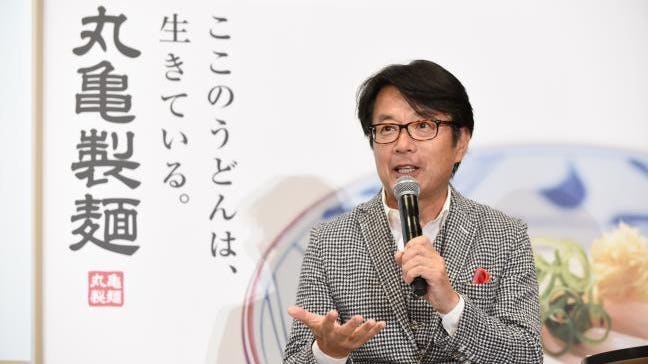Takaya Awata, founder and CEO of Tokyo-listed Toridoll Holdings, best known for its popular udon noodle restaurants, has joined the ranks of billionaires. Shares of Toridoll, which operates nearly 1,900 eateries around the world, jumped by more than a third over the past year as people, constrained during the pandemic, resumed eating out once again. Awata’s 48% stake in Toridoll is now worth $1.1 billion, based on Friday’s closing price of ¥3,930 ($26.8).
Established by Awata in 1990, Toridoll has grown to become one of Japan’s leading operators of noodle shops with chains such as Marugame Seimen. Toridoll also owns eateries that serve up spicy Chinese rice noodles, pancakes, ramen and freshly fried tempura. Since 2010, Awata has been focusing on expanding Toridoll’s footprint across the globe. Apart from Japan, where it has more than 1,000 restaurants, the company has a presence in the U.S., the U.K., Cambodia, Hong Kong, Indonesia, the Philippines, Taiwan and Vietnam.
A chunk of that global expansion has been achieved through acquisitions. In 2015, Awata acquired Asian fast food chain Wok to Walk with a presence in Europe. In 2018, Toridoll paid $242 million for Tam Jai International, operator of Hong Kong’s popular noodle chains, TamJai and SamGor, and took it public in a $180 million IPO three years later. In June this year, Toridoll bought Fulham Shore, a pizza and greek food restaurants operator in the U.K., for around $118 million.
Awata’s appetite for expansion is far from satiated. Toridoll has now earmarked more than $650 million for mergers and acquisitions in Europe, Asia and Greater China, with the aim of tripling its eateries to more than 5,500 and doubling revenue to $2 billion in the next five years.
In the quarter ended June, Toridoll reported record revenue of $360 million, up 20% from the same period last year. Apart from drawing in more diners to its restaurants, the company added a takeaway section, which contributed to the revenue rise. But inflation took its toll on Toridoll’s earnings as the rising costs of ingredients, for example, resulted in a 20% decline in quarterly net profit to $50 million.
Awata didn’t immediately respond to a comment request.
Awata, 61, latched on to the restaurant trade after dropping out of the Kobe City University of Foreign Studies. At age 25, he opened his first Japanese-style grilled chicken restaurant in 1985. But as he once disclosed in an interview to Japan’s broadcaster NHK, “We were barely getting any business.”
It was a visit to his late father’s hometown in Japan’s Kagawa prefecture, famous for its udon noodle shops, that gave him a new idea. Seeing long queues outside the udon eateries, which cooked the chewy, wheat-flour noodles right in front of their customers, a scene that Awata described in a blog post as an “emotional experience of food,” inspired him to set up his own noodle shop.
Rather than factory-produced noodles, Awata believes in offering freshly cooked fare, which offers a sensory experience that draws in customers. At Toridoll’s affordable, self-service restaurants, the noodles are prepared in front of diners in open kitchens and served up usually in a soy sauce-based broth with a choice of different toppings.
As his chain expanded, Awata took the company public on the Tokyo Stock Exchange in 2006, listing it initially on the Mothers bourse for startups and moving to TSE’s First section two years later. That gave him the wherewithal to set his sets further afield.
On a vacation to Hawaii, Awata got a hunch that there could be an overseas market for his concept. In 2011, Toridoll opened its first restaurant in Hawaii, followed by restaurants in China, Indonesia and other countries closer to home. In 2021, the first Marugame Seimen restaurant opened in London. Instead of a one-taste-fits-all-palates approach, Awata ensures that local preferences are catered to. Restaurants offer, for example, tomato-based broth in China, where it opened in 2012, and chili pepper toppings in Indonesia, where it launched a year later.
During the pandemic, Awata made free udon noodles available to underprivileged children in a food truck that traveled across Japan and also provided food in hospitals to healthcare workers. “The things that generate the passion for food are hidden in unexpected places,” Awata wrote on Toridoll’s website. “We discover those hidden things and offer them as new value to generate joy in our customers. This is the greatest driving force for our growth and our mission.”
—With assistance by James Simms
MORE FROM FORBES
Read the full article here





